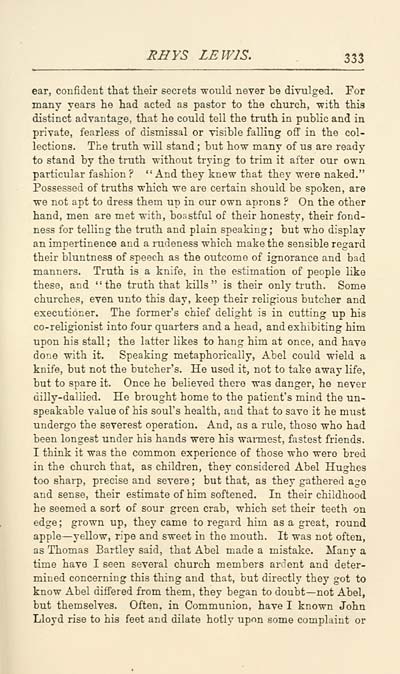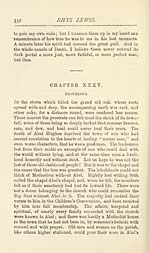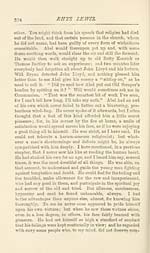Download files
Complete book:
Individual page:
Thumbnail gallery: Grid view | List view

liHYS LEWIS.
333
ear, confident that their secrets would never be divulged. For
many years lie had acted as pastor to the church, with this
distinct advantage, that he could tell the truth in public and in
private, fearless of dismissal or visible falling off in the col-
lections. The truth will stand ; but how many of us are ready
to stand by the truth without trying to trim it after our own
particular fashion ? "And they knew that they were naked."
Possessed of truths which we are certain should be spoken, are
we not apt to dress them up in our own aprons ? On the other
hand, men are met with, boastful of their honesty, their fond-
ness for telling the truth and plain speaking; but who display
an impertinence and a rudeness which make the sensible regard
their bluntness of speech as the outcome of ignorance and bad
manners. Truth is a knife, in the estimation of people like
these, and "the truth that kills" is their only truth. Some
churches, even unto this day, keep their religious butcher and
executioner. The former's chief delight is in cutting up his
co-religionist into four quarters and a head, and exhibiting him
upon his stall; the latter likes to hang him at once, and have
done with it. Speaking metaphorically, Abel could wield a
knife, but not the butcher's. He used it, not to take away life,
but to spare it. Once he believed there was danger, he never
dilly-daliied. He brought home to the patient's mind the un-
speakable value of his soul's health, and that to save it he must
undergo the severest operation. And, as a rule, those who had
been longest under his hands were his wannest, fastest friends.
I think it was the common experience of those who were bred
in the church that, as children, they considered Abel Hughes
too sharp, precise and severe ; but that, as they gathered age
and sense, their estimate of him softened. In their childhood
he seemed a sort of sour green crab, which set their teeth on
edge; grown up, they came to regard him as a great, round
apple— yellow, ripe and sweet in the mouth. It was not often,
as Thomas Bartley said, that Abel made a mistake. Many a
time have I seen several church members ardent and deter-
mined concerning this thing and that, but directly they got to
know Abel differed from them, they began to doubt— not Abel,
but themselves. Often, in Communion, have I known John
Lloyd rise to his feet and dilate hotly upon some complaint or
333
ear, confident that their secrets would never be divulged. For
many years lie had acted as pastor to the church, with this
distinct advantage, that he could tell the truth in public and in
private, fearless of dismissal or visible falling off in the col-
lections. The truth will stand ; but how many of us are ready
to stand by the truth without trying to trim it after our own
particular fashion ? "And they knew that they were naked."
Possessed of truths which we are certain should be spoken, are
we not apt to dress them up in our own aprons ? On the other
hand, men are met with, boastful of their honesty, their fond-
ness for telling the truth and plain speaking; but who display
an impertinence and a rudeness which make the sensible regard
their bluntness of speech as the outcome of ignorance and bad
manners. Truth is a knife, in the estimation of people like
these, and "the truth that kills" is their only truth. Some
churches, even unto this day, keep their religious butcher and
executioner. The former's chief delight is in cutting up his
co-religionist into four quarters and a head, and exhibiting him
upon his stall; the latter likes to hang him at once, and have
done with it. Speaking metaphorically, Abel could wield a
knife, but not the butcher's. He used it, not to take away life,
but to spare it. Once he believed there was danger, he never
dilly-daliied. He brought home to the patient's mind the un-
speakable value of his soul's health, and that to save it he must
undergo the severest operation. And, as a rule, those who had
been longest under his hands were his wannest, fastest friends.
I think it was the common experience of those who were bred
in the church that, as children, they considered Abel Hughes
too sharp, precise and severe ; but that, as they gathered age
and sense, their estimate of him softened. In their childhood
he seemed a sort of sour green crab, which set their teeth on
edge; grown up, they came to regard him as a great, round
apple— yellow, ripe and sweet in the mouth. It was not often,
as Thomas Bartley said, that Abel made a mistake. Many a
time have I seen several church members ardent and deter-
mined concerning this thing and that, but directly they got to
know Abel differed from them, they began to doubt— not Abel,
but themselves. Often, in Communion, have I known John
Lloyd rise to his feet and dilate hotly upon some complaint or
Set display mode to: Large image | Transcription
Images and transcriptions on this page, including medium image downloads, may be used under the Creative Commons Attribution 4.0 International Licence unless otherwise stated. ![]()
| Early Gaelic Book Collections > Blair Collection > Rhys Lewis, minister of Bethel > (341) |
|---|
| Permanent URL | https://digital.nls.uk/76375656 |
|---|
| Description | A selection of books from a collection of more than 500 titles, mostly on religious and literary topics. Also includes some material dealing with other Celtic languages and societies. Collection created towards the end of the 19th century by Lady Evelyn Stewart Murray. |
|---|
| Description | Selected items from five 'Special and Named Printed Collections'. Includes books in Gaelic and other Celtic languages, works about the Gaels, their languages, literature, culture and history. |
|---|

